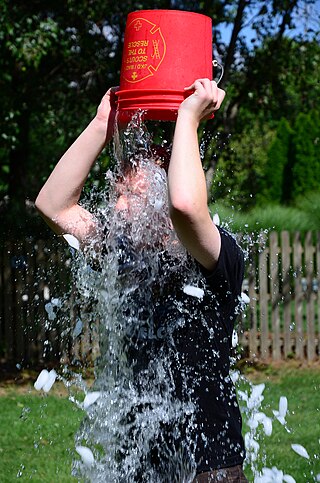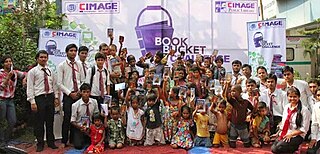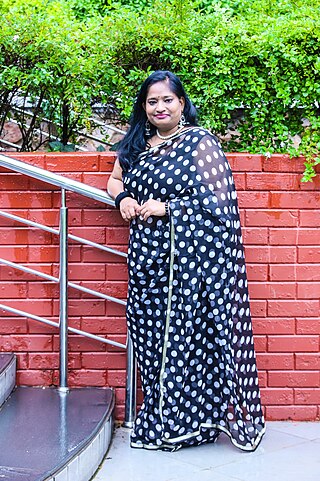Related Research Articles

The Green Revolution, or the Third Agricultural Revolution, was a period of technology transfer initiatives that saw greatly increased crop yields. These changes in agriculture began in developed countries in the early 20th century and spread globally until the late 1980s. In the late 1960s, farmers began incorporating new technologies such as high-yielding varieties of cereals, particularly dwarf wheat and rice, and the widespread use of chemical fertilizers, pesticides, and controlled irrigation.

CNBC Asia is a Singapore-based business news channel owned by the NBCUniversal Media Group, a subsidiary of Comcast. It is a pan-Asian branch of the U.S.-based CNBC.

The International Rice Research Institute (IRRI) is an international agricultural research and training organization with its headquarters in Los Baños, Laguna, in the Philippines, and offices in seventeen countries. IRRI is known for its work in developing rice varieties that contributed to the Green Revolution in the 1960s which preempted the famine in Asia.

Nandan Mohanrao Nilekani is an Indian entrepreneur. He co-founded Infosys and is the non-executive chairman of Infosys replacing R Seshasayee and Ravi Venkatesan, who were the co-chairs of the board, on 24 August 2017. After the exit of Vishal Sikka, Nilekani was appointed as non-executive chairman of the board effective 24 August 2017. He was the chairman of the Unique Identification Authority of India (UIDAI). After a successful career at Infosys, he headed the Government of India's technology committee, TAGUP. He is a member of Indian National Congress but not active in politics as of 2019.

Biryani is a mixed rice dish, mainly popular in South Asia. It is mainly made with rice, a choice of meat and lots of seasonings and spices. To cater to vegetarians in some cases, it is prepared by substituting vegetables or paneer for the meat. Sometimes eggs or potatoes are also added.
HuffPost is an American progressive news website, with localized and international editions. The site offers news, satire, blogs, and original content, and covers politics, business, entertainment, environment, technology, popular media, lifestyle, culture, comedy, healthy eating, young women's interests, and local news featuring columnists. It was created to provide a progressive alternative to conservative news websites such as the Drudge Report. The site contains its own content and user-generated content via video blogging, audio, and photo. In 2012, the website became the first commercially run United States digital media enterprise to win a Pulitzer Prize.

Media activism is a broad category of activism that utilizes media and communication technologies for social and political movements. Methods of media activism include publishing news on websites, creating video and audio investigations, spreading information about protests, or organizing campaigns relating to media and communications policies.

A milk substitute is any substance that resembles milk and can be used in the same ways as milk. Such substances may be variously known as non-dairy beverage, nut milk, grain milk, legume milk, mock milk and alternative milk.

Fried noodles are common throughout East Asia, Southeast Asia and South Asia. Many varieties, cooking styles, and ingredients exist.

Jonah H. Peretti is an American internet entrepreneur. He is a co-founder and CEO of BuzzFeed, a co-founder of The Huffington Post, and a developer of reblogging under the project "Reblog".
BuzzFeed, Inc. is an American Internet media, news and entertainment company with a focus on digital media. Based in New York City, BuzzFeed was founded in 2006 by Jonah Peretti and John S. Johnson III to focus on tracking viral content. Kenneth Lerer, co-founder and chairman of The Huffington Post, started as a co-founder and investor in BuzzFeed and is now the executive chairman.

A sausage sizzle is a community event in Australia and New Zealand to cook and serve sausages in bread which are grilled or barbecued sausages served in sliced bread or a bun with grilled onions and various condiments, most commonly tomato sauce, barbecue sauce or mustard. The term "sausage sizzle" came into common use in the 1980s and is used primarily to refer to the barbecuing event, but also to the sausage itself, mostly in Western Australia.

Neknominate, also known as neck and nominate, neknomination or neck nomination, is an online drinking game. The original rules of the game require the participants to film themselves drinking a pint of an alcoholic beverage, usually beer, in one gulp and upload the footage to the web. A participant then nominates another person to do the same within 24 hours.

Hashtag activism refers to the use of social media hashtags for Internet activism. The hashtag has become one of the many ways that social media contributes to civic engagement and social movements. The use of the hashtag on social media provides users with an opportunity to share information and opinions about social issues in a way that others (followers) can interact and engage as part of a larger conversation with the potential to create change. The hashtag itself consists of a word or phrase that is connected to a social or political issue, and fosters a place where discourse can occur. Social media provides an important platform for historically marginalized populations. Through the use of hashtags these groups are able to communicate, mobilize, and advocate for issues less visible to the mainstream.

The Ice Bucket Challenge, sometimes called the ALS Ice Bucket Challenge, was an activity involving the pouring of a bucket of ice water over a person's head, either by another person or self-administered, to promote awareness of the disease amyotrophic lateral sclerosis and encourage donations to research. The challenge was co-founded by Pat Quinn and Pete Frates; it went viral on social media during July–August 2014. In the United States, many people participated for the ALS Association, and in the United Kingdom, many people participated for the Motor Neurone Disease Association, although some individuals opted to donate their money from the Ice Bucket Challenge to other organizations.

The Book Bucket Challenge is an online challenge where people share the names of ten books that inspired them on their social networking pages, or donate books to the needy and share photos of this with friends on social networking sites. The challenge originated in India. It is named after the Ice Bucket Challenge, and went viral on social media during August and September 2014.

The Philippine bid for the 2019 FIBA Basketball World Cup was Samahang Basketbol ng Pilipinas' unsuccessful bid for the right to host the 2019 FIBA Basketball World Cup. On 16 March 2015, the bid became one of the only two formal candidates with the other bidding nation being China, as FIBA decided that the 2019 World Cup will be played in Asia.

The Robin Hood Army is a non profit volunteer-based organization that works to get surplus food from restaurants to the disadvantaged in cities across India and 10 other countries. They have served food to over 118.46 million people including individuals who are homeless and in orphanages, old-age homes, night shelters, homes for abandoned children, and public hospitals. The organization has over 218,912 volunteers in 401 cities.

Manju Latha Kalanidhi is an Indian journalist, feature writer, columnist and creator of Rice Bucket Challenge. She is currently the City Editor at The New Indian Express in Hyderabad.
References
- 1 2 3 4 5 Madhok, Diksha (August 25, 2014). "The story behind India's rice bucket challenge". Quartz . Retrieved September 13, 2014.
- 1 2 3 Rao, Mallika (August 26, 2014). "'Rice Bucket Challenge' Reminds World How Scarce Clean Water Is In India". Huffington Post . Retrieved September 13, 2014.
- 1 2 Harjani, Ansuya (August 25, 2014). "Indians switch ice for rice in new charity challenge". CNBC . Retrieved September 13, 2014.
- 1 2 Kohli, Amita (August 29, 2014). "The Rice Bucket Challenge, a New Made-in-India Charity Chain". NDTV . Retrieved September 13, 2014.
- 1 2 Kalra, Aditya (August 29, 2014). "In India, rice replaces ice in bucket challenge". Chicago Tribune . Retrieved September 13, 2014.
- ↑ Sheikh, Imaan (August 24, 2014). ""The Rice Bucket Challenge" Is India's Brilliant Alternative To The Ice Bucket Challenge. The idea is to donate a bucket/bowl of rice to someone in need". BuzzFeed . Retrieved September 13, 2014.
- ↑ Agrawal, Ravi (August 25, 2014). "India swaps ice for rice in new bucket challenge". CNN . Retrieved September 13, 2014.
- ↑ Poon, Linda (August 27, 2014). "Rice Bucket Challenge: Put Rice In Bucket, Do Not Pour Over Head". NPR (National Public Radio). Retrieved September 13, 2014.
- ↑ Aneja, Arpita (August 27, 2014). "Rice, Not Ice: India's Answer to the Ice Bucket Challenge". Time . Retrieved September 13, 2014.
- ↑ "Water-starved South Asia fills buckets with rice, not ice. Instead of ice, people in India and other south Asian countries are asking social media users to fill a bucket with rice to feed those in need". Agence France-Presse. August 26, 2014. Retrieved September 13, 2014.
- ↑ "Hello Ingress Agents". Ingress Philippines. September 3, 2014. Retrieved September 16, 2014.
- ↑ "From Ice to Rice, now use your bucket for another good gift!". Ingress Enlightened Philippines. Sep 3, 2014. Retrieved September 16, 2014.
- ↑ Gavilan, Jodesz (September 12, 2014). "Businessman starts Rice Bucket Challenge in PH, tags MVP". The Rappler. Retrieved September 12, 2014.